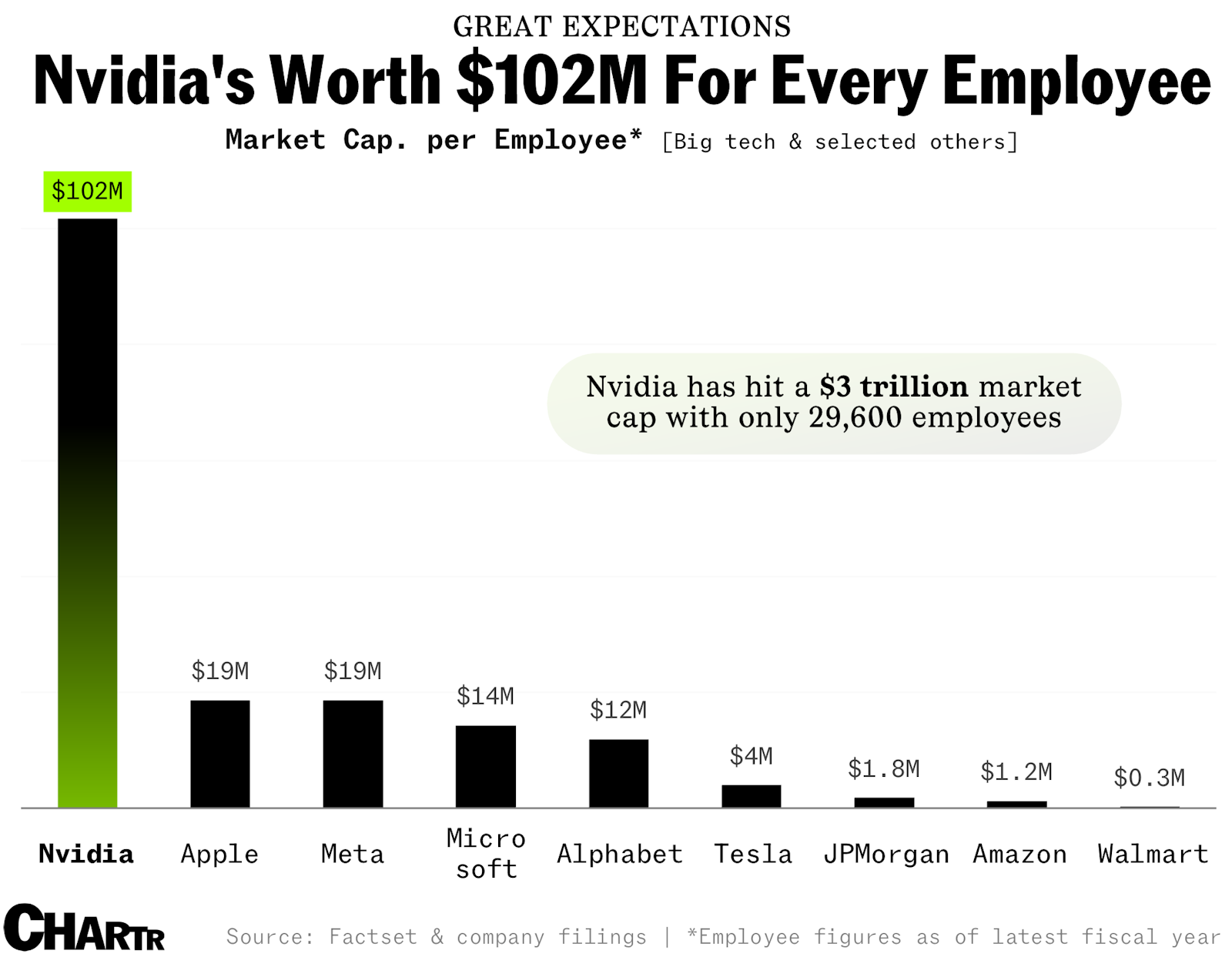- cross-posted to:
- technology@lemmy.world
- cross-posted to:
- technology@lemmy.world
"…For Nvidia, after this latest run-up took it north of the $3T milestone, the company is being valued at more than $100M for each of its 29,600 employees (per its filing that counted up to the end of Jan 2024).
That’s more than 5x any of its big tech peers, and hundreds of times higher than more labor-intensive companies like Walmart and Amazon. It is worth noting that Nvidia has very likely done some hiring since the end of January — I think the company might be in growth mode — but even if the HR department has been working non-stop, Nvidia will still be a major outlier on this simple measure.
We are running out of ways to describe Nvidia’s recent run… but a nine-figure valuation per employee is a new one."



The company’s valuation in a public company reflects the price that people pay for shares, so it shows the value of the company on the open market. The employees created this value, so it does indicate how much they each created quite accurately. And you would think that they’d at least get a representative percentage of that at least. I mean if you paint a painting and someone pays $1m for it, you get $1m gross. You make the software and IP that’s sold for $100m and you only get $100k a year, that’s kinda wack.
Firstly it shows the value of individual shares multiplied by the number of shares, not the company as a whole. Secondly, in this case Nvidia’s share price is based on what the company may be able to expand to do in the future, not what it currently does. Thirdly, where would this repersentive percentage come from? If it’s, issueing new stock to employees, A Nvida already does that a lot, B, creating new stock is not practically reliant on overall market cap so why is it relevant, and C, would employees also be punished for destroying the valuation if it turns out that every company doesn’t actually need a data center full of several thousand AI accelerators scraping the internet to make unique chat bots and Nvida’s market cap falls back down to what it would be based on how much money the company actually makes?
Again, Nvida primarily makes chip designs for outsourced fabrication, not market cap, that three trillion isn’t like revenue for Nvidia. In your painting example, market cap would be like if two unrelated billionaires bet 10 billion on whether or not that painter would be successful in selling a hundred different 1m paintings in the next six months, the painter might have an easier time say getting a loan for new supplies from a bank if they can point to the billionaire betting so much on them, but you know it’s not like the painter was actually paid that 10 billion that makes up the bet, right? So it’s kind of weird to say that the painter’s work as a whole is definitely worth that 10 billion bet.
The share price literally wouldn’t be what it was if people weren’t literally buying pieces of the company at that price. So it’s very literally saying what the company is worth on the open market. Even with all your obfuscation, that’s still the case.
Please explain to me how any of the child level explanation of the stock market is obfuscation, or again how you think the market cap, a purely theoretical number, could possibly be redistributed to employees outside of things the company already does to some extent, and finally why it applies in this case with a company who’s stock price is based purely on speculation about what it could do in the future and not anything it’s employees are currently doing.
The value of anything is what people are willing to pay for it, full stop.
Then by definition the employees are perfectly compensated for the value of their labor, as that labor can only be worth exactly what the company pays for it, and there is absolutely no reason why they should get any more. That’s actually one of the reasons why the value = money theory tends to be pretty rare outside of the far right libertarianism.
Honestly I can’t argue with that. That’s the reality of the situation. But emotionally they still deserve a bigger piece of what they created.